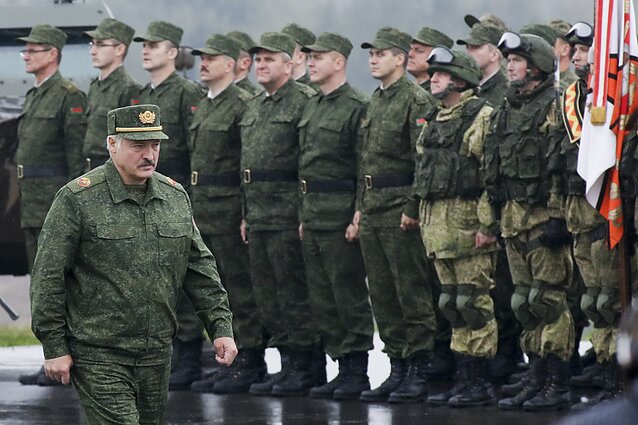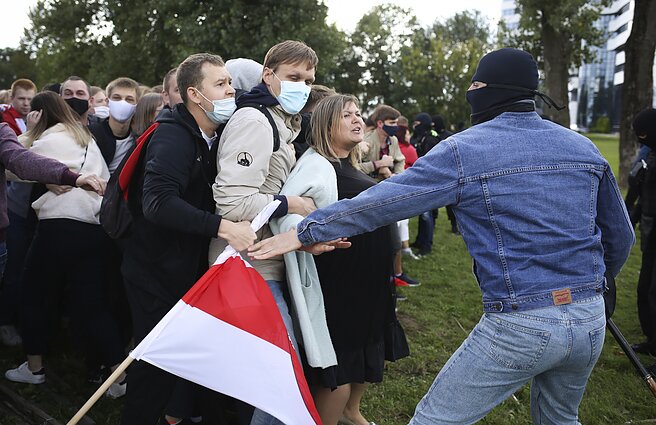
Lukashenko Threatens Border Closure
Lithuanian President Gitanas Nauseda has called Belarusian President Alexander Lukashenko’s recent threats (Sept. 17) to close the border a provocation without specific basis, and also warned of a “mirror” response with borders closing on both sides, if such a decision is made.
Lithuanian border guards said earlier in the day cross-border traffic remained normal on September 18. Nauseda discussed the situation in Belarus with his Polish counterpart Andrzej Duda and invited Poland to joint the Baltic states’ sanctions for Lukashenko and officials of his regime.
Nausėda called for a EU discussion on help to post-Lukashenko Belarus, and invited Poland to join the introduction of regional sanctions and also show solidarity with the Belarusians experiencing aggression and political persecution. The Polish leader said he is considering the introduction of national sanctions for Belarus. Lithuanian and Poland are both determined to urge EU member states to agree faster on pan-EU sanctions for Belarus.
Romas Austinskas, the president of the national road carriers’ association Linava, told the BNS agency on Sept.17 that Belarusian border guards had been thoroughly screening vehicles crossing the border with Lithuania for a few days. On Friday evening, about 180 trucks were waiting to cross from Lithuania into Belarus, and some 30 were queueing on the other side of the border, but this in itself was not unusual.

The European Union has confirmed plans to impose sanctions on Belarusian officials responsible for violence against protesters. The US State Department has also said it is considering new targeted sanctions on Minsk and is consulting with the EU on the matter. Lithuanian Defence Minister Raimundas Karoblis stated that even if the Belarusian forces move closer to Lithuania, no unplanned actions such as deploying additional forces would be implemented. He said “Our position has always been that we must remain calm and not give in to Lukashenko’s provocations”.
Lukashenko previously claimed that NATO was “stirring” in Lithuania and Poland, and Minsk officials have accused Vilnius of stoking tensions by hosting an armoured US battalion.
In a written comment United States Ambassador to Lithuania Robert Gilchrist stated that the embassy was “in constant contact with our Lithuanian counterparts regarding our ongoing partnership in security and defence. Our commitment to NATO remains ironclad, and we thank Lithuania for being welcoming hosts for US troops deployed here,” he said.

The battalion that deployed to Lithuania on September 4 arrived earlier than planned and will stay for longer than the government had initially indicated.
An armoured US battalion arrived in Lithuania on September 18. The 2nd Battalion of the 69th Regiment of the US Army 2nd Brigade will train with Lithuanian and other NATO troops in the Pabradė, close to Vilnius, according to the Lithuanian Defence Ministry. The American rotation will bring Abrams tanks and Bradley Infantry Fighting Vehicles.
The US troops are part of the US Army operation Atlantic Resolve, which is aimed at deterring Russia’s aggression in the region. American troops have been training in the Baltic states and Eastern Europe since Russia’s annexation of Crimea in the spring of 2014.
Belarus’ Alexander Lukashenko previously said NATO troops in Poland and Lithuania pose a threat, and put most of the country’s military on combat readiness. NATO and Lithuanian officials dismissed the statement as an attempt to divert attention from repressions on protesters in Belarus.
According to the Lithuanian Defence Ministry the exercises of the US troops in Lithuania are pre-planned and not associated with any events in the region.An armoured US battalion previously deployed to Lithuania for training between October 2019 and June 2020.
From LRT and Delfi.lt news





























